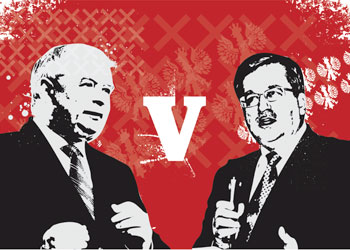Election 2010: Poland Decides
In Poland, 2010 was always going to be an election year, as President Lech Kaczyński was limping towards the end of his five-year term. Then there was the air crash in Smolensk, which killed the president alongside nearly a hundred others, including the entire top brass of the armed forces, and the election was brought forward from October to 20 June. Then came the floods and the risk that a state of emergency would have to be called, triggering an automatic postponement of the vote. It did not happen – but this will be an election year to remember nonetheless.
And yet, amidst all that, some things have held constant: Bronisław Komorowski of the governing Civic Platform (PO) remains the clear favourite to win the presidency, as he has been ever since beating the Oxford-educated foreign minister, Radek Sikorski, in the country’s first-ever primaries. And his chief rival is still a Kaczyński, albeit a different one – the deceased president’s twin brother, Jarosław, a former prime minister and the leader of the opposition Law and Justice Party (PiS).
These two candidates command the support of over four-fifths of the likely voters, according to pollsters, underlining and probably strengthening the increasing polarisation of Polish politics along slightly American lines, with the media darlings of the PO playing Democrats to PiS’s Republicans. As in the United States, neither party has a truly ideological profile, though Jarosław Kaczyński’s assiduous courting of Radio Maryja with its near-fanatical following on the religious fringe (not unlike the U.S. talk-radio hosts of the Rush Limbaugh variety) places him to the right of the other mainstream party. Both parties are socially quite conservative and both have a broadly favourable view of the markets, though the former is much more pronounced in PiS and the latter in PO.
The presidential candidates, however, cut contrasting figures. A proud father of five from an aristocratic background and a keen hunter, who shaved off his impressive moustache just in time for his presidential run, is facing off against a former trade unionist, a bachelor who has lived all of his adult life with a cat. Yet it is the “moustachioed aristocrat with a rifle” (as Komorowski was described by a prominent feminist writer, Kinga Dunin) who, as the candidate for the PO, enjoys the support of the liberal establishment while the unconventional cat-lover is banking on the affections of pious grandmothers.
If you follow received wisdom, you are in for more surprises of this sort. Jarosław Kaczyński, who once accused his opponents of assuming the place of ZOMO, the communist-era riot police notorious for shooting into crowds of peaceful protesters, has been remarkably soft-spoken, focusing on the need for national unity. The other camp has found rhetorical restraint somewhat harder. A highlight of his campaign, Komorowski’s unveiling of the support of 160 celebrities (from the Nobel-winning poet to the coach of the national football team) featured an octogenarian Auschwitz survivor and former foreign minister, Władysław Bartoszewski, suggesting that a man “with plenty of experience looking after furry animals, but who has never been a father to anyone or anything” is unfit for the presidency. And Andrzej Wajda, a film director with an Oscar to his name, declared the coming polls to be a “civil war”. Strong stuff, coming from a party that has declared “love” to be the guiding principle of its politics.
Wajda also called on the Komorowski campaign to build on the assistance lent by the private television broadcasters, “who are our friends” – undermining somewhat their protestations about their independence. But, while the private media are indeed more or less openly rooting for the PO, Kaczyński’s supporters effectively control the state-owned TVP, whose own claims to unbiased journalism sound hollow.
Exhibit one on the charge-sheet against public television has been a film showing mourners outside the presidential palace, voicing their conviction that Russia, probably in conspiracy with PO leader, Prime Minister Donald Tusk, caused the air crash that killed the president. This belief is apparently common among the PiS base and has served to fire up the inner core of supporters. This, together with the sympathy factor, is why Jarosław Kaczyński has a better chance of winning the presidency than his brother did. But it also helps explain why he is still highly unlikely to do so: the sort of conspiracy theories peddled by PiS grassroots (though not by party leaders) are off-putting for the educated, affluent city dwellers who are the most likely to turn out on the polling day.
In private, even his closest aides admit Kaczyński’s candidacy will be a success if he loses by less than 20 percentage points in the run-off against Komorowski. If polls are to be believed, there is a chance the run-off will be avoided entirely, as the PO’s candidate may get more than 50 percent of the vote in the first round. But the PO, as the cool party, tends to have its vote share overestimated, meaning the run-off will probably prove necessary. But it will be Komorowski’s to win.
Prior to the plane crash, he was planning to contrast his conciliatory style with Lech Kaczyński’s alleged aggression, manifest in his vetoing of all important bills sponsored by Tusk’s government. That plan had to be revised, when he, as speaker of Parliament, took over as acting president. He is now banking on the benefits of incumbency, demonstrating his statesmanlike qualities in the new role. It should work, unless he makes some monumental blunders. The polls are probably too kind to the speaker, but are unlikely to be that far off.

